It’s no mirage. The buildout of Denver toward the Wyoming state line continues unabated, a very visible metaphor for how innovation and technology have fundamentally reshaped Colorado’s economy in the past 10 years.
A decade ago, Colorado’s economy was primarily built on oil and minerals, transportation and logistics, agriculture, medical and health services, construction, and recreation and tourism. There were strong hints of a sea change in the tech sector, but it had not exploded yet.
Now, it has. Today, those seven pillars of the economy still remain — but they are dwarfed, in some cases, by booming business in advanced manufacturing, aerospace, biosciences, creative industries, defense & homeland security, electronics, infrastructure engineering, and technology & information. All of which rely on technology and are STEM-based. Not to mention being the first state in the country to legalize recreational marijuana, which has turned into a multi-billion-dollar agriculture and retail footprint on its own.
Add it all up, and Colorado presents one of the nation’s hottest and fastest-growing statewide economies. The massive buildout in Denver and other areas, and the exodus of companies moving from both coasts, plus native-grown companies, make Colorado a national leader in health, cybersecurity, aerospace, cloud, intelligence, data, sports and green sports technology, engineering, renewable energy, and more. Average tech sector wages have jumped from $54,000 to $115,000, the quality of living is high, and the growth continues at warp speed. Nearly 11,000 tech companies are now located in Colorado. With a population of 5.8 million and a median age of 37.5, the state is perfectly positioned demographically to maintain this momentum for years to come.

A quick sweep of recent deals illustrates just how widespread, diverse, and influential Colorado-based tech businesses are in the business and investment world:
• In 2021, sports merchandise company Fanatics raised $325 million to bring their total valuation to $18B, nearly tripling their valuation in one year. Jay-Z, SofBank, MLB, TWG Sports Media & Entertainment, and others participated in the funding round. Fanatics is going from vertical commerce to digital assets, sports betting, iGaming, media, and NFTs.
• Accenture invested in Pipeline, a SaaS startup with the mission of closing the gender equity gap. “Our investment in Pipeline aligns with Accenture Ventures’ commitment to cultivate the latest technologies, enhanced by human ingenuity, that solve for our clients’ most important challenges,” Tom Lounibos, a managing director at Accenture Ventures, said in a statement. “Pipeline can help our clients stop unconscious bias in the workplace and increase financial performance, allowing them to do well while doing good.”
• Reserve Trust, a financial tech that company works with businesses that embed and cross-border B2B payments, raised another $30 million.
• Tetra Insights of Boulder, which transcribes video and audio files, and helps product managers automate research operations and streamlines data analysis, received $5 million in funding.
To support all of this growth, and the jobs it creates, Colorado’s cities and metro areas have created some of the most diverse and creative Economic Development programs in the country, several of which we profile in this issue. Further, the Colorado Technology Association serves as the major logistics and information clearinghouse, point of contact, and resource center, with more than 300 members and a network of 18,000 leaders. Built In Colorado, Choose Colorado, and the Colorado Chamber of Commerce are also major resource centers. Colleges, universities, community colleges, and trade schools throughout the state feature STEM and tech-centric curricula, and research and development continues strong with organizations like the Rocky Mountain Center of Innovation & Technology, located in Loveland, 50 miles from Denver.
In the following pages, we celebrate Colorado’s ascension to become the largest tech zone between the coasts, and the third fastest-growing in all 50 states. We look at the trade associations, the economic development programs of Greeley, Grand Junction, and Durango, and companies at the cutting edge of technology, such as Zaiser Motors, that will grow our business and society deep into the 21st century.
Doing Business in Colorado? 4 Organizations to Contact
Are you doing business in Colorado’s bustling tech zone — or any of the 15 thriving economic sectors in the state? Are you planning to relocate you and your company to the Rocky Mountain State, create a satellite office, work remotely, or start a new business or initiative?
Several support organizations are waiting to help. They include local and regional Economic Development Departments and accelerator/incubator programs throughout the state (some featured in this issue), but also four groups designed for this very service: the Colorado Technology Association, Built In Colorado, Choose Colorado, and the Colorado Chamber of Commerce. A closer look:
Colorado Technology Association
The Colorado Technology Association is a service network dedicated to the state’s vibrant technology sector, which totals more than 1 million workers. Currently numbering more than 300 members and an active network of 18,000 leaders, the CTA creates meaningful networks and relationships, advocates for smart policy, fosters growth, and offers forums for relationship building. It also partners with private and public sector companies to connect them to the information and resources to be successful, agile, and innovative.
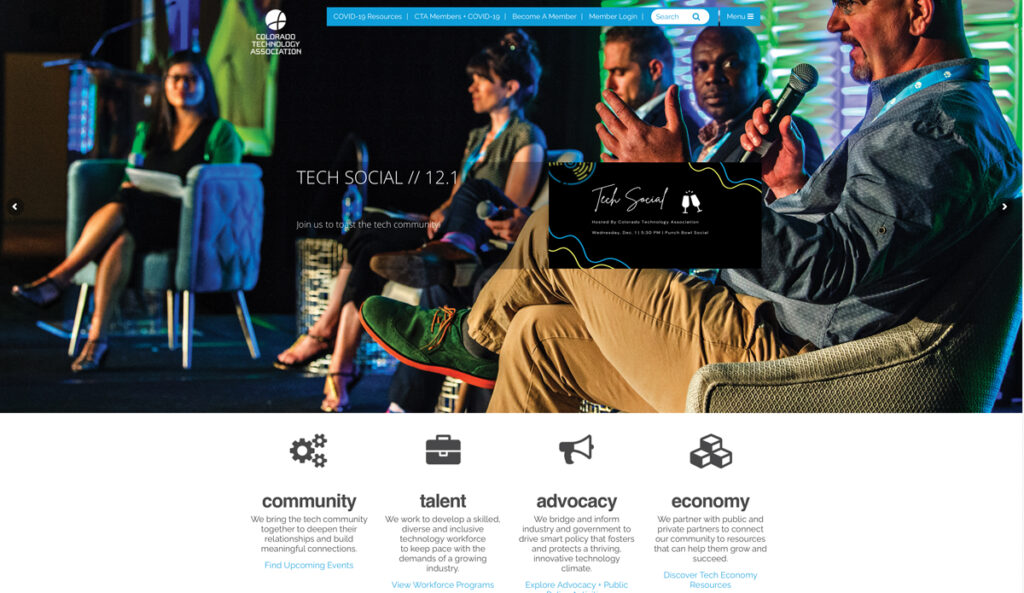
One of the CTA’s biggest services is its ongoing event, seminar, and webinar series. Upcoming are the October Womenar: Overcoming Imposter Syndrome (Oct. 13), an orientation of the association, CTA 101 (Oct. 20), and Insights Series: Diversity and Inclusion in Tech (Oct. 28). They also produce the popular Women In Technology conference annually. The CTA website is loaded with networking opportunities, resources, and economic information, and other material to help businesses continually expand their markets and their reaches in the community.
Founding, platinum- and gold-level investors of the CTA include Oracles, Lumen, PWC, Accenture, Arrow Electronics, CapTech, Comcast, DaVita, Dell Emc, Dish Network, Flexential, Google, Okta, and Zayo.
Built in Colorado is the state’s resource hub for startups and technology. Over the years, they’ve worked with 4,100 startups and helped secure more than 2,000 local and remote jobs. They also work with startups to secure seed funding; one of the latest wins is a $21-million capital raising effort by FirstMile Ventures, which will be used to pre-seed and seed 30 tech companies. Built in Colorado also networks with tech hubs in seven other vibrant locations — Austin, Boston, Chicago, Los Angeles, New York City, San Francisco, and Seattle.
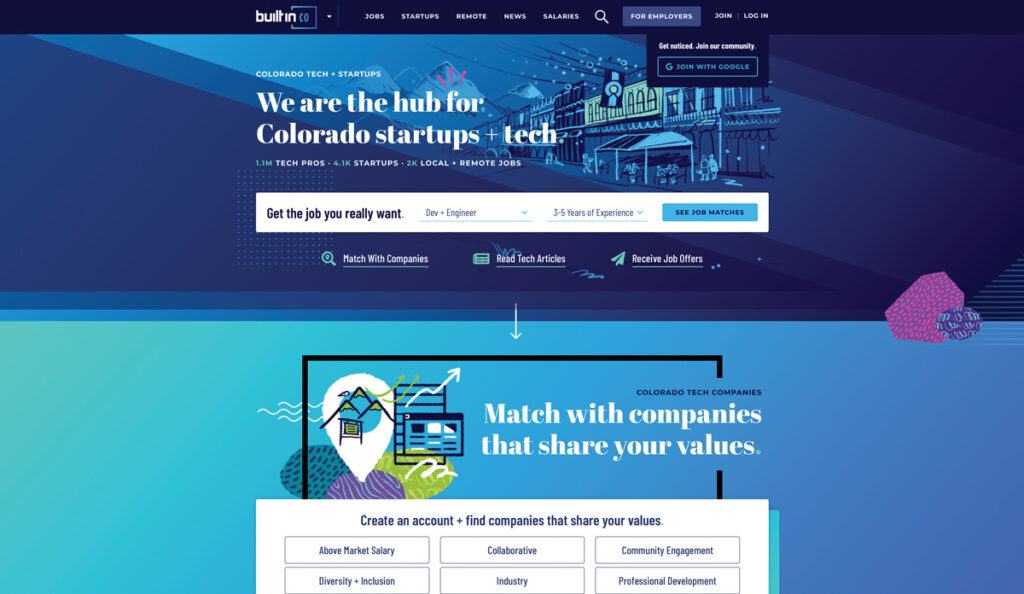
The Built in Colorado website features hubs for employers seeking employees (and the reverse), best places in Colorado to work and receive good benefits packages, and a series of four Colorado Business Guides — Best Companies, Coolest Tech Offices, Best Perks, and Women in Colorado Tech. The site also includes a valuable series of staff-written articles and blogs within the 15 primary economic tech sectors in the state.
Choose Colorado is the website of the Colorado Office of Economic Development and International Trade. The office works with statewide partners to encourage dynamic economic development and sustainable job growth. The office’s primary services to communities and businesses include:
• Building a strong public-private approach statewide for economic development activities
• Monitoring economic conditions statewide and strengthening regional economies
• Supporting entrepreneurs and small businesses
• Increasing quality job creation by expanding and attracting businesses
• Retaining existing jobs through responsive programs and a supportive
business climate
• Positioning Colorado as a global leader in tourism, aerospace, bioscience, and
renewable energy
• Assisting the state’s economy, while preserving the quality of life
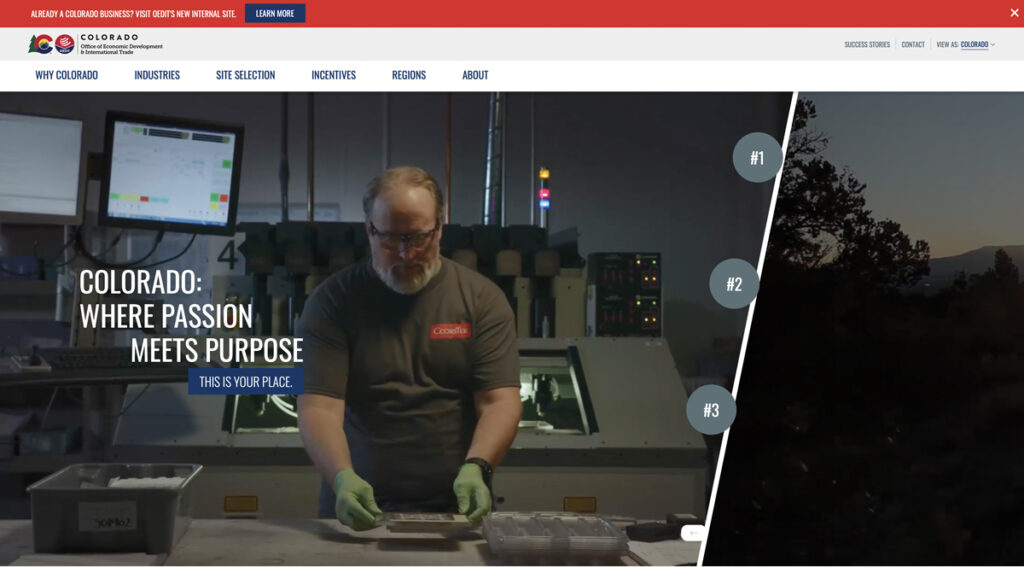
“One of our priorities right now is to make sure we retail our local kids when they enter the job force,” said Durango EDD Executive Director Laura Marchino, president of the Colorado Office of Economic Development and International Trade. “Because of our tech boom and business boom the past ten years, they don’t have to leave anymore. We’re making sure we’re upskilling our native population as necessary, so they receive the same opportunities as the kids that migrate from other states for these prime jobs and our lifestyle.”
Colorado Chamber of Commerce
The Colorado Chamber of Commerce has seen the state through economic upturns and downturns alike since it formed in 1965. Their mission: to grow the business footprint of Colorado and tout its many benefits statewide and nationally.
The 3,000 member-strong association works with the state legislature and lobbying on behalf of businesses to improve the cost of doing business, advocating for pro-business state governance, increasing the quality of workers, and strengthening Colorado’s critical infrastructure. The Chamber is the only business association that advocates for businesses of all sizes from a statewide, multi-industry perspective. Through its Resource Center, the Chamber provides updates to members on recent legislation and regulations. It fills and also shares the latest news on policy councils for economic, governmental affairs, healthcare, labor & employment, and tax issues. It also serves as the Colorado representative of the National Association of Manufacturers.

Partner members of the Colorado Chamber of Commerce include Mission Trustees Ball, Pinnacle, and Molson Coors; and Gold partners AAA Colorado, Climax Molybdenum, Google, HealthOne, Lockheed Martin, Wells Fargo, and Innovation & Tech Today marketing partner Xcel Energy.
Grand Junction’s Tech and Remote Worker Boom
Before COVID-19 shut everyone down in 2020, the Grand Junction Economic Partnership (GJEP) was already showing strong tech and outdoor recreation growth to go with agriculture and core industries that have sustained the area since it was settled.
During the pandemic, that dynamic not only changed, but did something amazing. Out-of-state tech and digital economy workers saw the many lifestyle advantages to moving to Colorado’s westernmost city, sold their houses and moved to town — starting what is now a booming remote worker presence. That was coupled with a sharp jump in sales among the more than 20 outdoor recreation businesses in the area.

“They brought their tech jobs and talent into the community. We had what they wanted — greater quality of life, lower business costs, and the chance to adopt a healthier lifestyle and mindset,” GJEP Deputy Director Steve Jozefczyk said.
“A big migration of tech workers wanted to connect with our business community, which led to a big uptick in co-working spaces, and tech groups being created organically.”
What an accomplishment for a region that the Brookings Institute predicted would be among the hardest-hit by COVID-19, in deaths and business decline. One year later, the Brookings Institute offered a far different assessment: Grand Junction was ranked #57 on its list of Best Performing U.S. cities. The city is also #12 in job growth in Colorado.
What’s behind this? First, GJEP pivoted and leaned into what was working in 2020. Which meant tech, the digital economy, migrating workers, and outdoor recreation. They coordinated or advised on think tanks, work sessions, and virtual networking events, started the Welcome Wagon (a play on the Wild West) to connect newcomers with local businesswomen and men, and provided additional resources and assistance.
“The Welcome Wagon has been a huge success,” Jozefczyk said. “We put 20 newbies together with locals for a year to help find friends, colleagues and help people get integrated. This was our capacity; we have more than 20 on our waiting list now, so we’re building out capacity. Every quarter, we do a bigger event as well.”
As for businesses, three major players came to town:
• CloudRise, the cloud-based software services provider, expanded operations from Denver.
• Pax8, a cloud business software platformer and consultant, expanded from Greenwood Village, CO to Grand Junction and hired in-office and remote workers. (One of those was former GJEP official Mara Hardy.)
• Hayden Data, with offices in Sydney, Australia and Chattanooga, TN, opened up in Grand Junction. They make sensors that are fixed atop power lines to detect movement, temperature, degrading wood, power outages, fires, and wind. Along with them, a manufacturer started building aluminum boxes for the sensors — bringing in another 200+ employees between them.
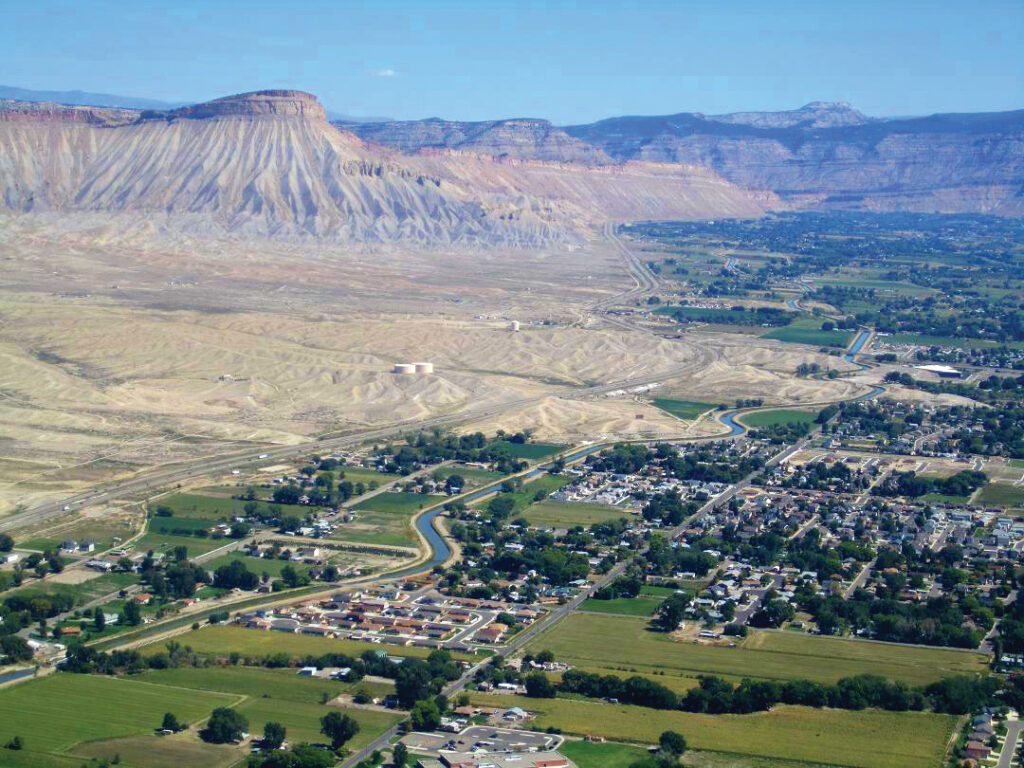
Moving forward again is Riverfront de Las Colonias, Grand Junction’s beautiful riverfront recreation facility, park, living community, and industrial park. The first industrial park tenant, Bonsai Designs, brought in CloudRise to occupy part of its facility. An engineering firm, KLJ, also moved in. Jozefczyk added that GJEP is working with another tenant to bring together NPOs with ties to outdoor recreation and river conservation — a nod to Grand Junction’s focus on sustainability and healthy living.
On the west side of Grand Junction’s River District, construction for Riverfront Dos Rios — the western “bookend” of the development, with Riverfront de Las Colonias on the eastern side — is underway. It will feature residential, commercial, restaurant, and retail houses, and businesses.
Natural Beauty Brings Natural Growth in Stunning Region 9
Southwest Colorado grabs the eye immediately with its stunning natural beauty. Between the steep, rugged Alps-like San Juan Mountains, sprawl of open land, waterways, and postcard-perfect vistas, the area grabs recreation enthusiasts on sight alone.

This is precisely how the Region 9 Economic Development District of Southwest Colorado promotes the area. In a region where cities and towns are spread apart, some by the mountains, tourism, and recreation have become the nucleus of a wide-reaching, sophisticated strategy touching everyone from major corporations to gig workers moving into the area.
It is that movement that has the Region 9 office hopping — and evolving.
“Tourism and recreation represent our No. 1 industry,” said Executive Director Laura Marchino. “But we also realize tourism-related jobs are often low-paying service jobs. We’re working hard to create more high-paying jobs. We get a lot of intelligent, talented people because they love outdoor recreation but need to find or create jobs when they get here.”
Durango, long a retiree haven, is the largest city in Region 9, followed by Cortez and the hot springs haven of Pagosa Springs, but the district reaches out to deeply involve Archuleta, Dolores, La Plata, Montezuma, and San Juan counties, as well as serving the Southern Ute and Ute Mountain tribes. Visitors often come for historical gems such as Mesa Verde, national parks and monuments, hiking or bike trails, hot springs or ice climbing areas. Then many of them decide to stay; the area’s demographic makeup is largely comprised of college-educated professionals and retirees.
From longstanding district business icons like Rocky Mountain Chocolate Factory to hot newer operations like Tailwinds (hydration products for runners and cyclists), Voormi (an REI-like outdoor retailer), and Cold Case (all-temperature cell phone storage cases), the district is growing new businesses in a variety of ways.
Tops among the initiatives, and the direct impact of Region 9 EDD to assist business development, is SCAPE, which could be described as a next-gen incubator. “We only take southwestern Colorado companies, in order to build our local ecosystem,” Marchino said. “Then we do an annual showcase, where companies pitch to investors every September.”
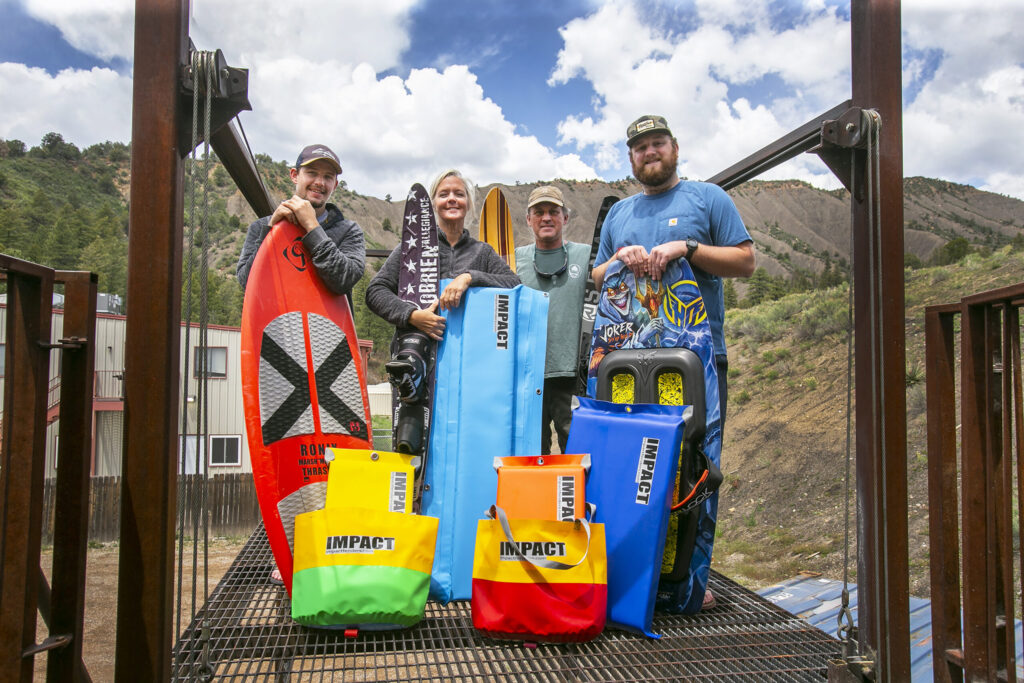
Established in 2013, SCAPE takes an average of five startups a year through an intensive six-month mentoring and business modeling program, in order to launch locally. They also make development funds available through an ambitious fund-raising and investor outreach program.
In all, 43 businesses have been assisted by SCAPE, with $25 million raised for their development and 182 jobs created. During the five years Marchino has been Executive Director, an additional funding source, microloans, have increased as well, from $3 million to $8 million.
“We try to assist businesses to either start here and stay here; or to move here and grow locally, nationally or internationally from Region 9,” Marchino said. “It’s a very dynamic time. We still have a youthful population overall, and we do everything we can to keep them here early in their careers. All of our recreation makes us very attractive. I’ve seen a lot of startups that are really thriving.”
However, any mountainous area is not without its challenges; namely, in transportation logistics. With several local and regional airports, but no international airport nearby, Region 9 deals with winter road closures in the mountain passes. When the primary transportation mode for distribution is truck, innovative solutions come into play.
Take the Rocky Mountain Chocolate Factory. Now franchising its operation, the company had trouble getting chocolate in and out of the area during winters. They started their own trucking company, which now brings back full truckloads for other companies so that they don’t waste a trip with an empty return haul.
“I’m really noticing how helpful, diverse, and resilient our Region is,” Marchino explained. “We have a real diverse economy, so if we have a bad tourism year, we’re still strong. There are many pieces of the economic pie here now — energy, timber, agriculture, and financial and retail services as well. Our communities have very different needs. We have an excellent relationship with all 17 of our local governments; we help them with prospects and finding financing.”
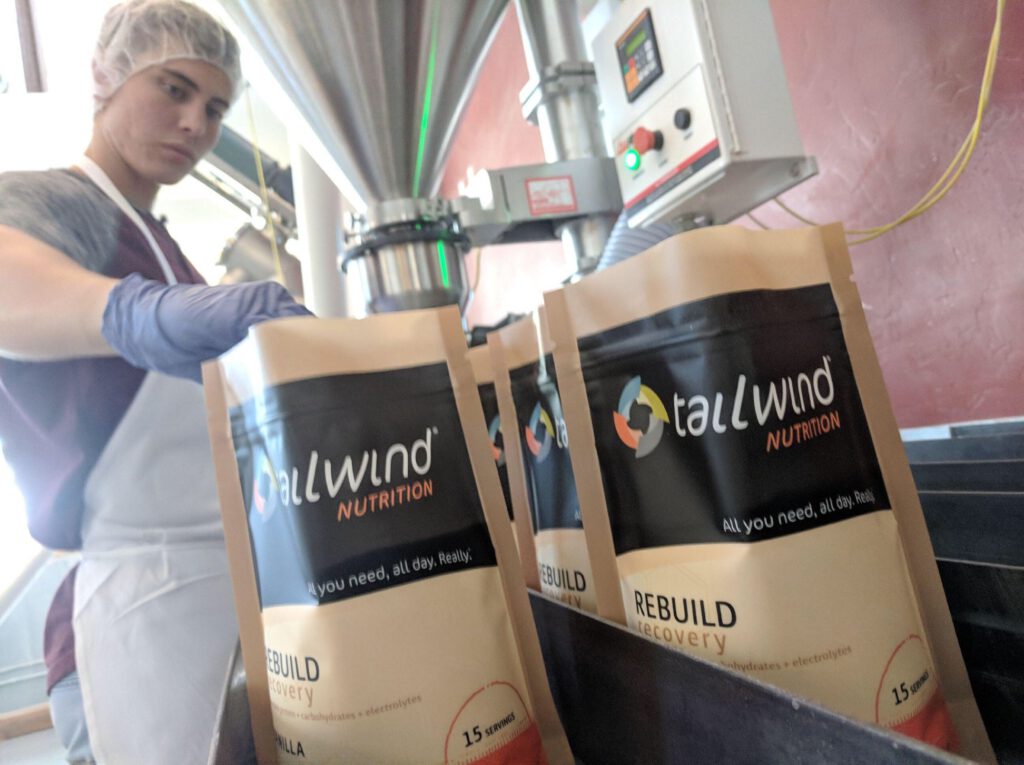
Weld County and Greeley continue to expand impressively in new and established industries by building on a 150-year-old manufacturing and technology backbone
They started arriving at the old Union Colony after 19th-century newspaperman Horace Greeley’s famous clarion call, “Go West Young Man.” Now, 150-plus years later, Greeley and Weld County continue to provide the structural, innovation, and development backbone for some of America’s most critical industries.
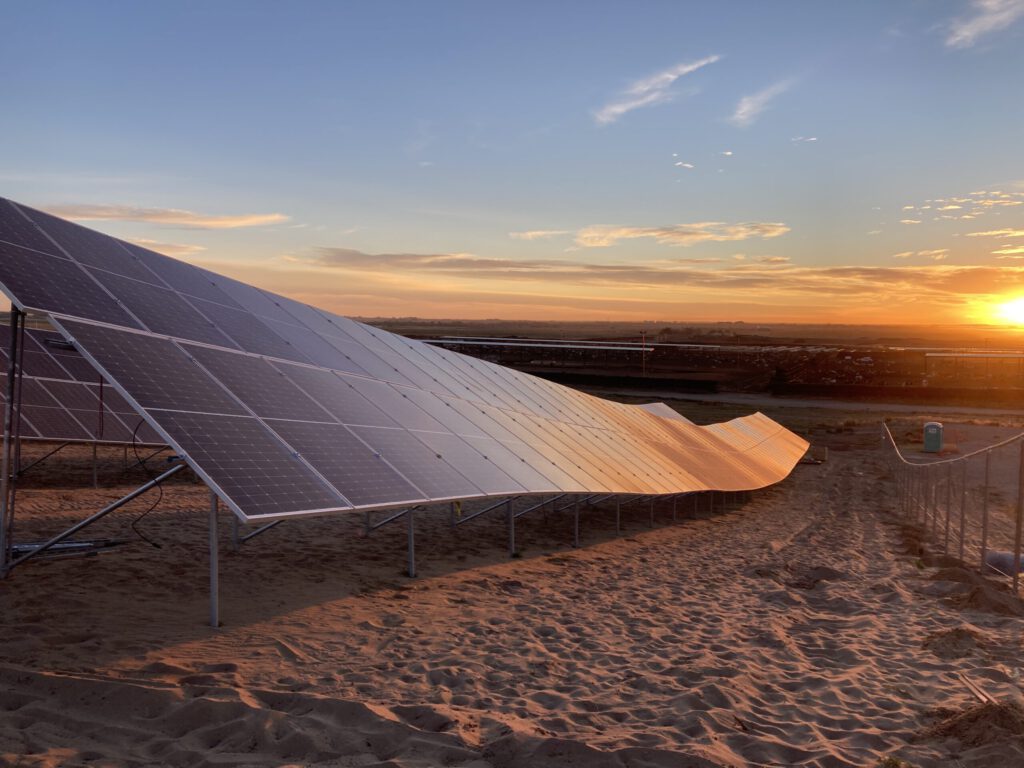
“We have a great confluence of really smart people sharing ideas that rally around an opportunity,” said Benjamin Snow, the Director of Economic Health and Housing for the City of Greeley. “The opportunity, as we see it, is our future business and history. Between 2010 and 2019, we were the fourth fastest-growing region in the country – behind Austin, the Villages, and St. George. Currently, we have the land and water to be able to have a city of a quarter-million.”
Not only does the spacious region set up ideally, but leaders have made it advantageous for businesses to move in. A 30,000 square foot enterprise zone lies next to Greeley Regional Airport, along with opportunity zones in downtown Greeley and the industrial sector. The City of Greeley, Weld County, and another development group, Upstate Colorado, are all growing the area. Numerous other incentives exist — not to mention lower costs, a healthy, recreation-based workforce, hundreds of miles of running, hiking, and bike trails, and stunning outdoor beauty.
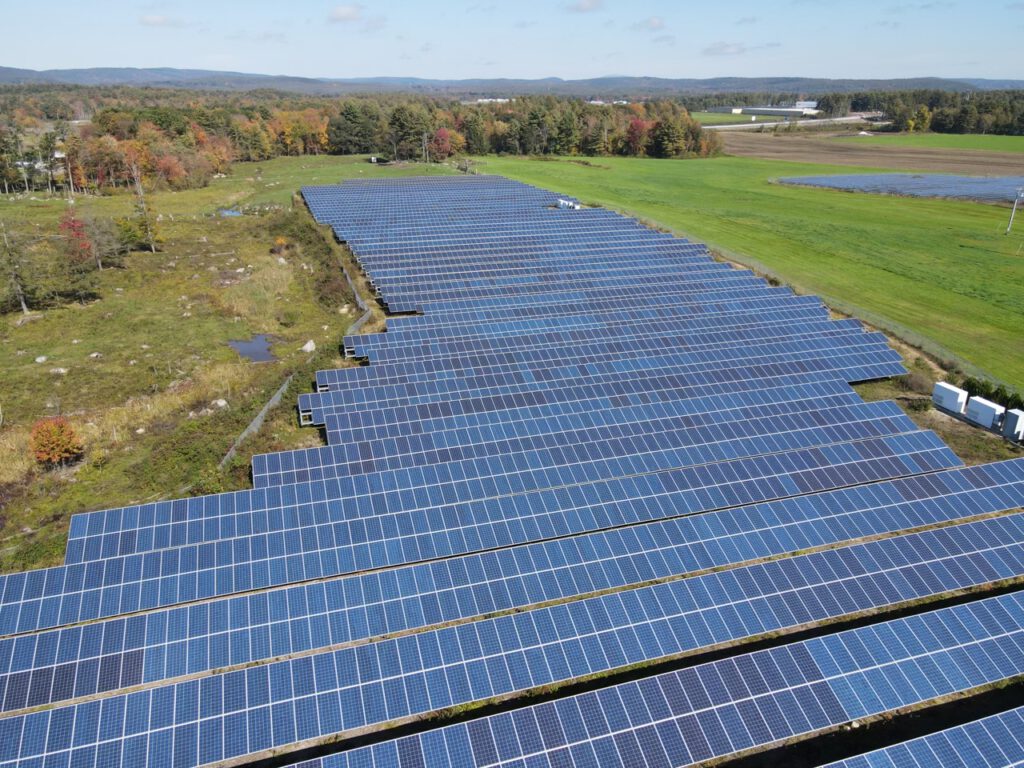
“I like to say that this is where America prototypes. The amount of brainpower here … a huge amount of opportunity,” said Dixon Dick, CEO of CoSolve, which creates IoT stacks, financing, and networking avenues for businesses. “We do IoT, and have a venture cap fund to try to create a virtuous circle of backers’ money staying in Greeley or Weld County, not going to the coasts.”

Not only are business leaders of Weld County and Greeley innovative and influential amidst two of the fastest-evolving systems in the economy – agriculture production and new and natural energy development — but they’re also great networkers. “We are literally bridging energy and food,” said Dallas Everhart of University of Northern Colorado’s Montfort School of Business.
“We’re building out an economic ecosystem for the next decades,” said Economic Development Manager Philip McCready, also co-founder of innovation cluster Colorado Fab Tech and the Colorado Hemp Industries Collaborative. “Within that ecosystem, you see some of the country’s brightest leaders developing tools for decades to come and doing innovative things in all parts of their businesses.”
One of those people is Jason Suntych, the COO and co-founder of Xiant Technologies, a biotech firm with applications to control plant and animal behavior for agricultural purposes using light. Xiant has lit 4 million commercial laying hens around the U.S. and are studying applications in open-air feedlots. Even larger trials are coming. “By modulating light and creating recipes of different wavelengths and frequencies, you can grow the plant with much less stress,” Suntych said. “All the hardware is created from ground up; no off-the-shelf technology.
“Our investment is coming from ag or oil and gas minded investors in NE Colorado – we’re up to $24 million after the latest $8 million funding. We found Greeley and Weld County an outstanding place to create the business we’ve created.”
A century ago, Weld County and its 2.5 million farmable acres (now 1.75 million) were home to 25% of America’s sugar industry. “We’re fortunate to be building on the backbone of a long, successful track record in manufacturing and industry,” McCready said.

Such is the case with Jordan Energy and Food Enterprises, which started in the northeast in 2009 and has set up a western hub in Weld County. The company has finished its first solar project in Weld County. “We are developing comprehensive solutions for agriculture businesses when it comes to renewable energy,” COO Jake Yurek said. “That began exclusively with solar, but with improvements, now it means solar plus other efficiency solutions, like battery storage. More businesses are looking at producing energy themselves and not pulling it from the grid; when you can produce your own, it’s going to unlock unique opportunities for businesses as the technology continues to improve.”
Perhaps the hottest new technology pertains to creating renewable natural gas (RNG) from farm biowaste. Pairing solar with anaerobic digestion is one such opportunity. The solar array can provide renewable energy to the digester and generate lease revenue for the land the dairy doesn’t otherwise farm, providing diversified income,” Yurek said.
Not every operation in Greeley and Weld County is out front — but the contributions are still outsized on a regional and national level. When it comes to CNE Creative Enterprises, “I can guarantee virtually no one has heard of us, because we’re basically a ghost company,” CEO Eric Fitzsimons said. “Our job is to come alongside other small businesses and help them be successful, and let them take all the credit. We have 1,500 water purification plants running systems we designed, we’ve done arrays for oil and gas, camera arrays, police products, geofence designs … a variety of things.
“We’re unique in that we have one of those facilities where you could dream it up in the morning and probably have it in your hands at night. Own 3D printing lab, machine shop, steel fab shop, plastic fab shop, circuit board production line, we source or create our own tools and machines,” he added.
Weld County’s vast agricultural space and predominately sunny weather make it prime growing land for cannabis and hemp farms. Two years ago, Vantage Hemp (featured in the Summer 2020 edition of our sister publication, Cannabis & Tech Today) moved into the area as Harv Johal’s 10th business startup. “And my last,” he quipped. “I don’t have the gestational fortitude to start another business like I did in my 20s.”
Vantage has built two buildings totaling 60,000 square feet in preparation for an August 2022 open as a 24/7 grow facility with 120 staff. While the bulk of the business is built on APIs (Active Pharmaceutical Ingredient), they’re also doing formulation for pharma companies nationally. The company also recently signed a pair of agreements to manufacture finished product.
“What we’re seeing is a rich economic ecosystem coming together, to where businesses can turn within the county for innovative solutions to help apply to areas where they’ve created their own wealth,” Johal said.
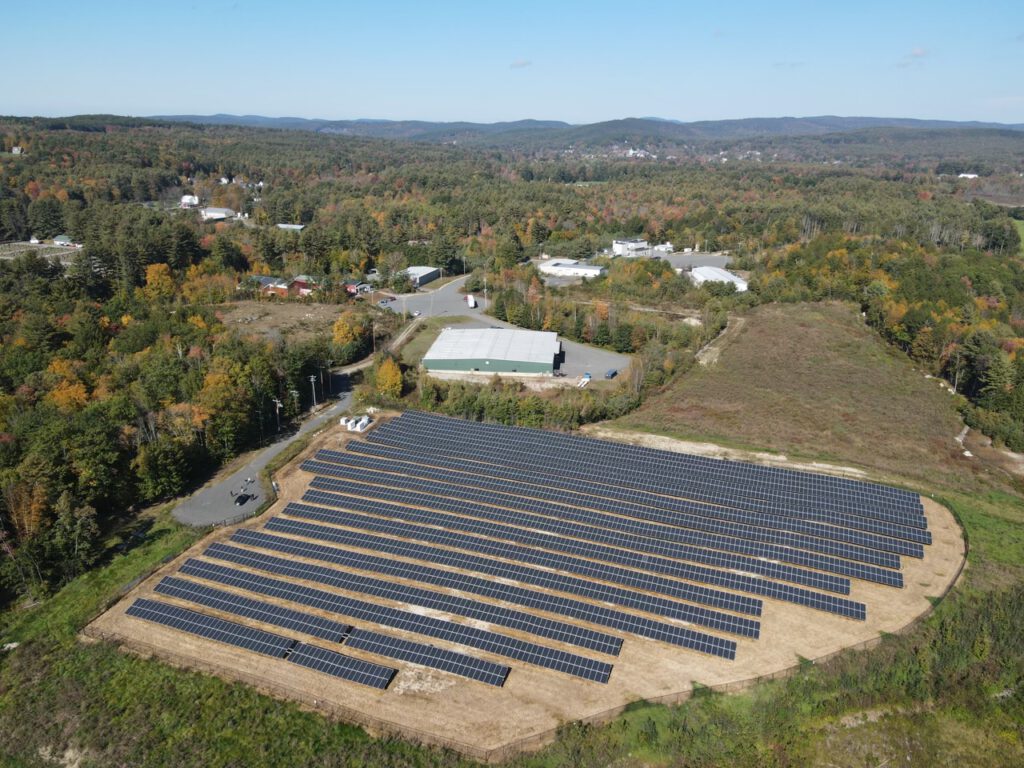
“We’ve been strengthening in all six of our core areas, which are construction, agriculture, energy, education, healthcare, and manufacturing,” Snow noted. “For Phil and I, we have to find ways to innovate within and across these industries. That’s where our job growth is focused.”
At the University of Northern Colorado (Monfort College of Business), located in Greeley, Dallas Everhart focuses on getting students ready for all of this, with a twist — he’s focusing on entrepreneurial development. “Our mantra at UNC (MCB) is ’preparing career-ready leaders,’” he said. “My primary target market is employers; students don’t have a future if we don’t have a relationship with employers. We want them to be able to elevate.”
To do that, Everhart and his team run an Entrepreneurial Challenge, a higher education event rather than a Shark Tank-like pitch competition. Some 24 student managers coordinate activities, which draw up to 500 high school students to see and learn of ideas of college students from throughout the state.
“We’re giving them tools to be successful, then teaching them how to use them, then having them apply the tools. Some entrepreneurs do business as naturally as the sun coming up in the east, but to the rest of us, what they do is scary! These skills are valuable even if you’re not going to be an entrepreneur; businesses everywhere need creative thinkers,” Everhart said.
How Xcel Energy is Powering the Future of Colorado Communities
It’s a time of change and opportunity when it comes to the ways we power our lives and communities. Since its inception as the Denver Gas Co. in 1869, Xcel Energy has been innovating to serve its 1.5 million electric and natural gas customers as well as power Colorado’s communities.

One innovative move? Xcel Energy was the first major U.S. power company to announce a vision to provide customers with 100% carbon-free electricity by 2050, with an interim goal to reduce carbon emissions 80% by 2030. The company has already reduced carbon emissions 51% from 2005 levels, but looking beyond 2030, Xcel Energy recognizes and embraces the need for advanced, carbon-free, 24/7 power technologies.
No innovative technology is off the table to eliminate the remaining 20% of carbon from the system. From advanced wind and solar or zero-carbon fuels like hydrogen to advanced nuclear energy or carbon capture — Xcel Energy is partnering with industry, government, and its customers to drive innovation further, faster.
The team is also working to bring innovation to the streets. Transportation is now the largest source of emissions in the country, and Xcel Energy is playing a crucial role in reducing emissions from that sector while providing new electric vehicle options for its customers and communities.
“We have programs launching this summer that span solutions for home, multi-family, commercial fleet, and community-based charging, plus rebate programs and an EV school bus program,” said Kelly Flenniken, community relations director for Xcel Energy in Colorado. “Our EV infrastructure investments create jobs and grow our Colorado economy.”
Colorado’s growth and the economic effects of the COVID-19 pandemic have highlighted the importance of enhancing economic development. For many businesses, energy is a top consideration in where they locate – it may be their largest expense or the focus of corporate sustainability goals.
As one of the top providers of clean energy among U.S. power companies, according to the American Clean Power Association, Xcel Energy is also ready to help new and expanding companies, too.

Xcel Energy’s real estate programs help communities attract capital investment and create new, high-paying jobs. A robust and credible certification protocol results in a broad inventory of sites and buildings throughout the state.
“When businesses are equipped with the knowledge gathered during our due diligence process, they can move faster as they evaluate a Colorado location and available real estate,” said Tom Bailey, senior director
of corporate economic development at Xcel Energy. “We also coordinate with municipalities and local economic development organizations, which streamlines the process.”
In addition, Xcel Energy’s Economic Development Rate can provide eligible companies with a discount for up to 10 years. With innovative programs, clean energy leadership, and a steadfast commitment to its communities, Xcel Energy gives Colorado a leg up in deals with new, relocating, or expanding companies.
There’s no doubt: Colorado’s future is bright. Xcel Energy is proud to power it.











